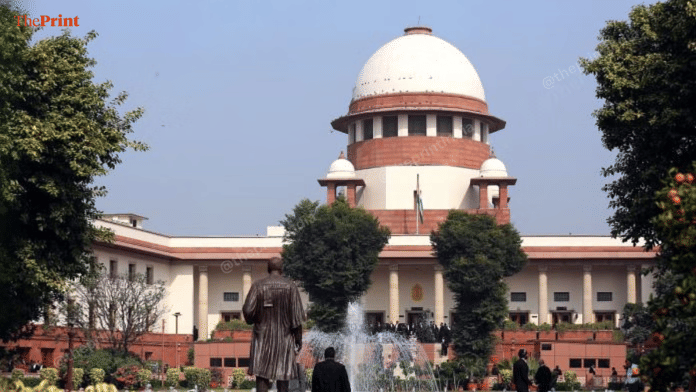New Delhi: Members of Other Backward Classes (OBCs) in Madhya Pradesh continue to face deep-rooted social discrimination, exclusion and marginalisation, despite their large presence in the state, leaving them confined to traditional caste-based occupations and segregated localities, without access to basic amenities—with these submissions, the BJP-led state government has sought to justify before the Supreme Court its decision to raise the reservation for OBCs from 14 to 27 percent.
This move has taken the total reservation in the state beyond the 50 percent ceiling fixed in the Mandal Commission case.
The state referred to the 2011 Census report to highlight that OBCs constitute more than 48 percent of MP’s population. It also cited data from a 2023 survey conducted by Dr B.R. Ambedkar University of Social Sciences (state university established by Madhya Pradesh government) to underscore the stark disconnect between the demographic strength and OBCs’ representation in the state. According to this survey, the OBC population in the state is over 50 percent.
Pushing for broad-based social reforms, along with reservation, the government affidavit in the top court talked about the entrenched and multi-dimensional backwardness suffered by the community in the state. It even drew references from the findings of the Mahajan Commissions, appointed in 1980 by then Congress government in the state.
Various reports, prepared from time to time by the Madhya Pradesh Backward Classes Commission (MPBCC), were also placed along with the government affidavit to establish the case favouring 27 percent reservation for OBCs.
The government affidavit was filed in response to a pending litigation before the Supreme Court, which is hearing a batch of petitions, some of which have been pending since 2014.
With regard to the 1983 Mahajan Commission report, the state government said that it was prepared after extensive field studies, and contained valid and quantifiable data supporting 35 percent reservation for OBCs, as they were found to be socially, educationally and economically backward.
This was reaffirmed by the State Backward Classes Commission, which listed 94 OBC castes/sub-castes engaged predominantly in traditional, menial and agriculture-related occupations, reflecting their persistent marginalisation.
The backwardness goes beyond mere numerical disadvantage and manifests in systemic exclusion, discrimination and deprivation, the affidavit added. MPBCC’s annual reports of 1996-97, 1999-2000 and 2000-2001 too “recommended for enhanced reservation”, it said.
While the 1996-97 report recommended raising the limit from 14 percent to 27 percent, the 1999-2000 one “found” the 14 percent “inadequate”, and noted that many other states provided higher reservations for OBCs. The 2000–01 report recommended increasing the limit to 35 percent.
Disclosing details of the 2023 survey, the state further contended in court that despite the numbers, OBCs remain socially backward in practice.
To the argument that reservation would breach the 50 percent limit—as underlined by the apex court in the 1992 Indira Sawhney case—the state emphasised that the same judgment had carved out exceptional circumstances that justified the departure from the rule. These included regional imbalances, remoteness, or overwhelming backwardness.
Also Read: Why does Tamil Nadu have Adi Dravidar welfare dept instead of SC welfare dept? Debate reaches HC
History of OBC reservation in MP
The litigation over OBC reservation in MP has had a checkered history. The first move to enhance reservation for OBCs was made in 1994 after the state legislature amended the MP Lok Seva (Reservation for Scheduled Castes, Scheduled Tribe and Other Backward Classes) Act, 1994, which gave 15, 18 and 14 percent reservation in Class I and Class II posts, and 13, 20 and 14 percent reservation in Class III posts, to Scheduled Castes, Scheduled Tribes and OBC’s, respectively.
In September 1995, this was further revised to 15, 23 and 27 percent in Class I and II posts, and 13, 23 and 27 in Class III posts.
However, this was returned in December 2001 by the President, who declined to clear it, citing the 50 percent upper limit. Following this, the state had amended the law in April 2002, making provision for 16, 20 and 14 percent reservation on all classes of posts for SCs, STs and OBCs.
Months later, in November 2002, the state again amended the law to increase OBC reservation to 27 percent, but “the President neither gave assent to the Bill, nor withheld it, nor returned it to the Governor with a request for the State Legislature to reconsider it”.
In the absence of any communication from the President, the state government then decided to initiate the exercise of increasing the reservation for OBCs to 27 percent. A resolution to this effect was cleared on 30 June, 2003.
This was challenged before the Madhya Pradesh High Court, which quashed the resolution on 13 October, 2014. An appeal against this decision is still pending in the Supreme Court.
Meanwhile, in March 2019, the state enacted an ordinance, attempting to once again raise OBC reservation from 14 percent to 27 percent. On a petition, the high court stayed the operation of this ordinance. But this stay was restricted only to the field of medical education. Given that it was a limited stay, the state government went ahead to implement reservation in other fields, which faced a legal challenge before the high court, from where it has now come before the Supreme Court.
(Edited by Mannat Chugh)







So, they won’t improve education and healthcare facilities. No focus on industrialization. Just increase reservations. And voila backwardness goes away. This is the panacea according to lazy politicians.